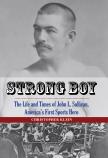Irish-American Idol
Strong Boy—The Life and Times of John L. Sullivan, America’s First Sports Hero by Christopher Klein is a raw, powerful and disturbing biography—a head-spinning take on Sullivan’s turbulent life. Unlike other sports memoirists, Klein doesn’t pull punches; he offers slashing comments on a mythic sports hero.
Sullivan’s arrogant boast of the 1880s, “I can lick any son-of-a-bitch in the world,” still resonates today inside smoky barrooms across American and Europe. This daring claim could announce only one man: Irish-American John L. Sullivan, the world’s heavyweight boxing champion. A legendary fighter, he won the title in the last bare-knuckle championship and then travelled the world like no sportsman before him, defending his title against all comers. But as Klein documents, Sullivan was a legendary drinker who turned up for many of his most important contests scarcely able to defend himself.
Klein’s biography gives us an undiluted view of the Boston Strong Boy, a hero of the ring in the days when prizefighting was illegal, though avidly followed by every social class. Klein recounts the many times when the law gave Sullivan more trouble than many of his ring opponents. Sullivan fought and beat all the great boxers of his generation—Paddy Ryan, Charley Mitchell, Jake Kilrain—with the notable exception a black fighter, Peter Jackson, against whom Sullivan drew the color line.
For more than a decade Sullivan was invincible. The championship seemed to belong to him. To have met him was a rare honor and people stood in line to “shake the hand that shook the hand of John L. Sullivan,” as a popular catchphrase of the time ran.
Strong Boy is the story of one of the most feared boxers in history up to that point. Sullivan terrified contenders across the globe. With his swaggering virility he would become one of those outrageous characters that made the turn of the century a colorful era. He drank as he fought, prodigiously, never meeting a saloon he didn’t like. And the nation loved him for it. Klein’s recounting of “The Babe Ruth of Boxing” is a story that could only be found in the history pages of early 20th-century America. He was the Muhammad Ali of his generation.
Sullivan was born the son of an immigrant father who fled from Ireland to the United States. The anti-Irish, anti-Catholic discrimination faced by the famine refugees was not subtle. It blared in black and white, in shop windows and newspaper classified ads. He was faced with: “No Irish person need apply” and “Catholics and dogs not allowed.” However, Sullivan’s toughness and work ethic carried him to the highest levels of one of the most unforgiving sports. When he won the heavyweight belt in 1882, no Bostonians celebrated more than the Irish, who felt blistered by the Brahmin scorn since their arrival. Now one of their own was champion of America. Sullivan instantly became an Irish-American idol, one of the country’s first ethnic heroes. In London Sullivan was lauded by the Prince of Wales; Teddy Roosevelt considered him an outstanding American; Baron Rothschild staged one of the champion’s fights on his private estate in France.
After Sullivan became champion, he spent most of his time touring as an actor on the vaudevillian circuit instead of training. Klein chronicles his rapid fistic decline—his spousal abuse, assault and battery, womanizing and his constant drinking. Sullivan’s lack of training caught up with him, and with a “tumorous belly, sagging skin, and eyes hanging low in their eye sockets, he was matched with a brash young boxer named Jim Corbett.”
The Sullivan-Corbett match was held on Sept. 7, 1892. “Corbett sat in his dressing room as a priest gave him a blessing, while a relaxed Sullivan cracked jokes with his trainers,” writes Klein.The kid from Chicago was given little chance, but the champion who had a punch like a thunderbolt from Zeus was well past his prime, dissipated by years of boozing and inactivity, and on this night, one of the greatest upsets in sporting history occurred.
In 1915, after losing his title belt, Sullivan announced a new pursuit: “I am ‘coming back’ to have a go with a bigger champion than I ever was—the champion of champions—John Barleycorn.” Klein writes, “His anti-alcohol speech reflected the arc of his life—it was entitled, ‘From Glory to Gutter to God.’” Klein’s book shows the genuine effort made by a troubled soul to gain some understanding of the long, dissipated journey that had been his life. Despite gaining fame and fortune, Sullivan was someone obsessed with the need to redeem himself.
Upon his death, bereaved Bostonians kept spilling in to pay respects to the old gladiator. The mourners were still filing through when it was time to leave for the 10 a.m. funeral Mass at St. Paul’s Church. Klein says, “His coffin was as big as a bed….His iconic white mustache flowed gallantly, with the fine curls on each end. The lifeless right hand that had once delivered such violent punishment clenched a black rosary.”
Father Lyons blessed Sullivan’s grave and reminded all in attendance that Sullivan’s greatest triumph had come outside the ring—his victory over the bottle. Reading Strong Boy is like having a ringside seat at the colorful and extravagant world of The Great John L. Sullivan. He was a deeply flawed man, but he remains a great champion, an important cultural figure and a worthy sports idol.
This article also appeared in print, under the headline “Irish-American Idol,” in the February 16, 2015, issue.








